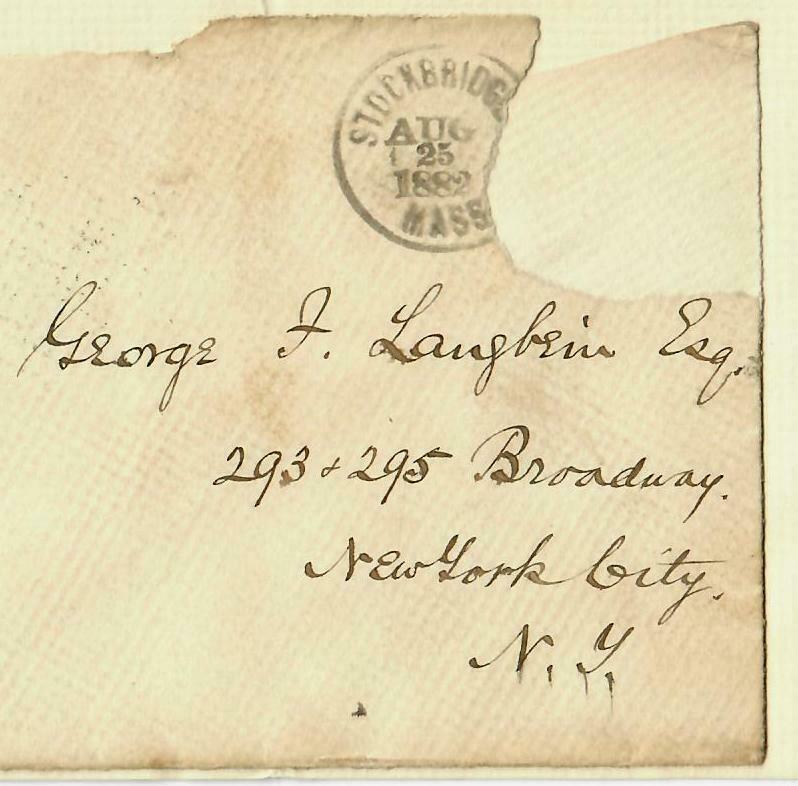-40%
RARE! "Museum Of Modern Art" Joseph Choate Hand Written Letter Todd Mueller COA
$ 184.79
- Description
- Size Guide
Description
Official PayPal Conversion RatesAdd
Currency Converter
To Your Items
Up for auction a RARE! "Museum Of Modern Art" Joseph Choate Hand Written Letter .
This item is certified authentic by Todd Mueller and comes with their Certificate of Authenticity.
ES-5209
Joseph Hodges Choate
(January 24, 1832 – May 14, 1917) was an
American
lawyer and diplomat. Choate was associated with many of the most famous
litigations
in American legal history, including the
Kansas
prohibition
cases, the
Chinese exclusion
cases, the Maynard election returns case, the
Income Tax Suit
, and the
Tilden
, Stanford, and AT Stewart will cases. In the public sphere, he was influential in the founding of the
Metropolitan Museum of Art
. Choate was born in
Salem, Massachusetts
on January 24, 1832. He was the son of Margaret Manning (
née
Hodges) Choate and physician George Choate. Among his siblings was
William Gardner Choate
, a
United States District Judge
of the
United States District Court for the Southern District of New York
, and Dr.
George Cheyne Shattuck Choate
. He also had a sister, Caroline Choate) His father's first cousin (his first cousin once removed) was
Rufus Choate
, a
U.S. Representative
and
U.S. Senator
from Massachusetts. His paternal grandparents were George Choate and Susanna Choate, and his maternal grandparents were Gamaliel Hodges and Sarah (née Williams) Hodges.
Choate graduated from
Harvard College
in 1852 and
Harvard Law School
in 1854. After graduation from law school, Choate was admitted first to the Massachusetts in 1855, followed by admission to the New York bar in 1856, after which he entered the law office of Scudder & Carter in
New York City
. His success in his profession was immediate, and in 1860 he became junior partner in the firm of Evarts, Southmayd & Choate, the senior partner in which was
William M. Evarts
. This firm and its successor, that of Evarts, Choate & Beaman, remained for many years among the leading law firms of New York and of the country, the activities of both being national rather than local. During these busy years, Choate was associated with many of the most famous legal cases in American legal history, including the
Tilden
,
Alexander Turney Stewart
, and
Jane Stanford
will cases, the
Kansas
prohibition
cases, the
Chinese exclusion
cases (in which he argued against the law's validity), the
Isaac H. Maynard
election returns case, and the
Income Tax Suit
. In 1871, he became a member of the
Committee of Seventy
in
New York City
, which was instrumental in breaking up the
Tweed Ring
, and later assisted in the prosecution of the indicted officials. He served as president of the
American Bar Association
, the
New York State Bar Association
, and the
New York City Bar Association
. In the retrial of the
General Fitz-John Porter
case, he obtained a reversal of the decision of the original court-martial. His greatest reputation was won perhaps in cross-examination. In politics, he allied himself with the
Republican Party
on its organization, being a frequent speaker in presidential campaigns, beginning with that of 1856. He never held political office, although he was a candidate for the Republican U.S. senatorial nomination for New York against Senator
Thomas C. Platt
in 1897. In 1894, he was president of the New York state constitutional convention. He was appointed, by
President McKinley
,
U.S. Ambassador to the United Kingdom
to succeed
John Hay
in 1899, and remained in this position after
Theodore Roosevelt
's ascendancy to the presidency until the spring of 1905. In England, he won great personal popularity, and accomplished much in fostering the good relations of the two great English-speaking powers. He was one of the representatives of the United States at the
second Peace Congress at the Hague
in 1907.
View more great items












